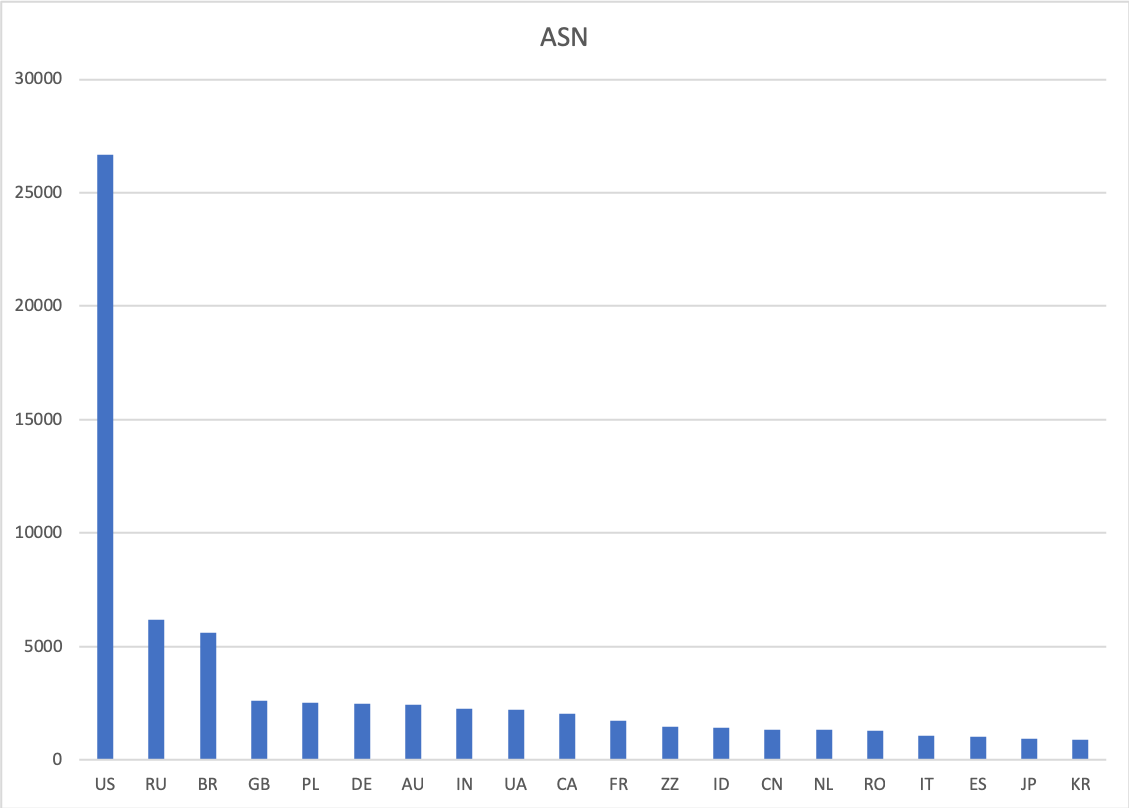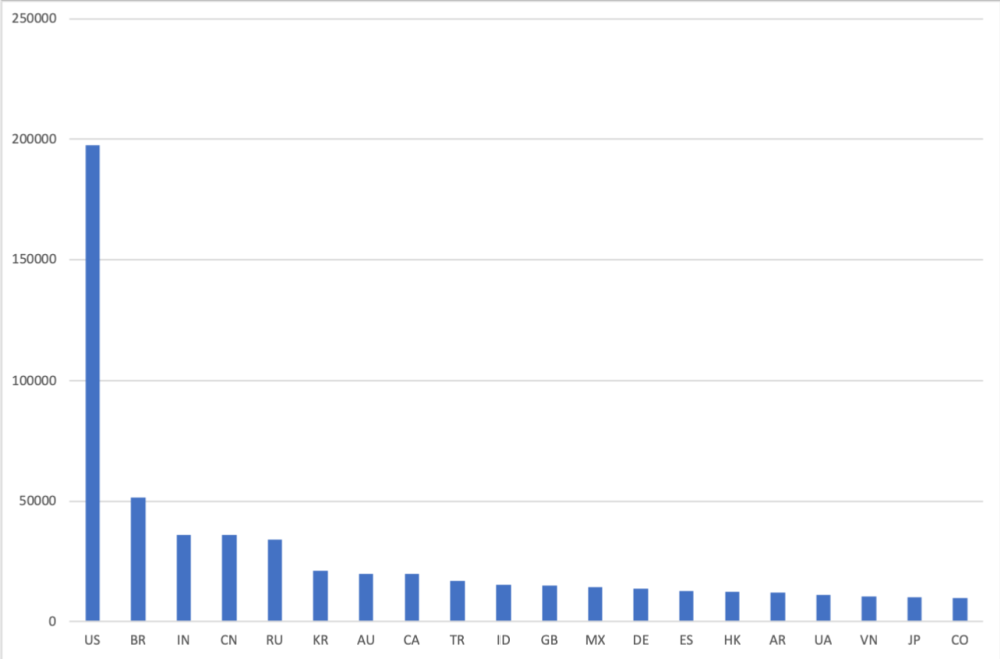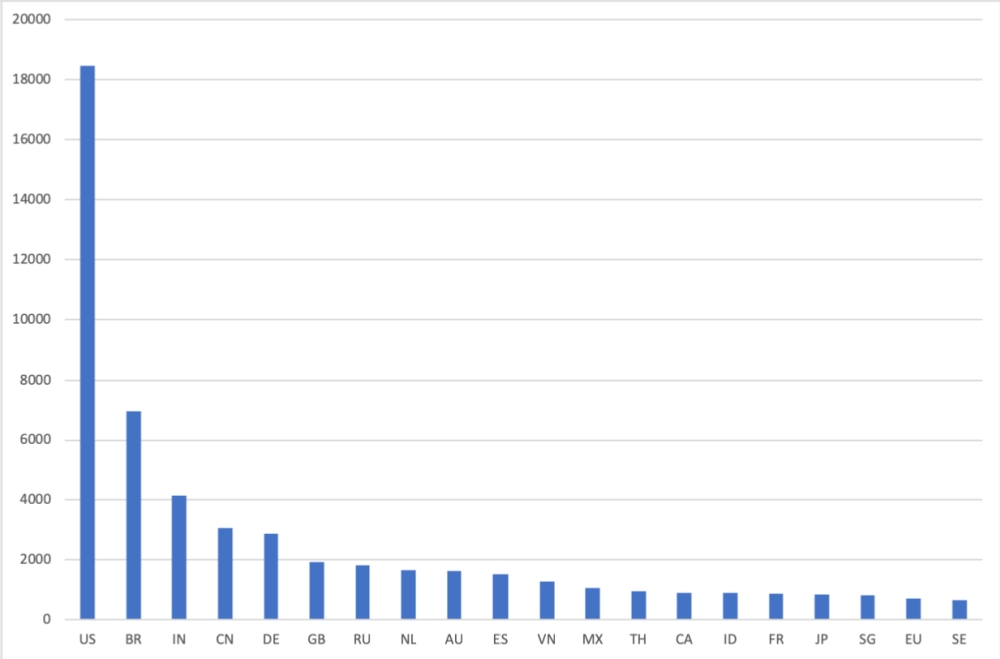As many of our readers know, Qrator.Radar is constantly researching global BGP connectivity, as well as regional. Since the Internet stands for “Interconnected Networks,” to ensure the best possible quality and speed the interconnectivity of individual networks should be rich and diverse, with their growth motivated on a sound competitive basis.
The fault-resistance of an internet connection in any given region or country is tied to the number of alternate routes between ASes. Though, as we stated before in our Internet Segments Reliability reports, some paths are obviously more critical compared to the others (for example, the paths to the Tier-1 transit ISPs or autonomous systems hosting authoritative DNS servers), which means that having as many reachable routes as possible is the only viable way to ensure adequate system scalability, stability and robustness.
This time, we are going to have a closer look at the Russian Federation internet segment. There are reasons to keep an eye on that segment: according to the numbers provided by the RIPE database, there are 6183 autonomous systems in Russia, out of 88664 registered worldwide, which stands for 6.87% of total.
This percentage puts Russia on a second place in the world, right after the USA (30.08% of registered ASes) and before Brazil, owning 6.34% of all autonomous systems. Effects of changes in the Russian connectivity could be observed across many other countries dependant on or adjacent to that connectivity, and ultimately by almost any ISP in the world.
The overview

Diagram 1. AS distribution among countries, top 20
In IPv4 ISPs from Russian Federation announce 33933 out of 774859 globally visible prefixes, which translates into 4.38% and puts Russian internet segment on the fifth place of such rating. Those, explicitly RU-announced prefixes cover 4.3*10^7 of unique IP-addresses out of 2.9*10^9 announced globally — 1.51%, 11th place.

Diagram 2. Network prefix number distribution among countries in IPv4, top 20
In IPv6 ISPs from Russian Federation announce 1831 out of 65532 globally visible prefixes, which is 2.79% and place 7. Those prefixes cover 1.3*10^32 of unique IPv6 addresses out of 1.5*10^34 globally announced — 0.84%, 18th place.

Diagram 3. Network prefix number distribution in IPv6 among countries, top 20
One of many ways to evaluate the country’s Internet connectivity and reliability is to rank the autonomous systems within the country by the number of prefixes announced. This method is vulnerable to route deaggregation, which is gradually balanced eventually by the excessive filtering of the de-aggregated prefixes in the ISP equipment due to the constant inevitable growth of route tables, which consumes memory.
The individual scale
| IPv4 top 20 | IPv6 top 20 | ||||
|---|---|---|---|---|---|
| ASN | AS Name | Number of prefixes | ASN | AS Name | Number of prefixes |
| 12389 | ROSTELECOM-AS | 2279 | 31133 | MF-MGSM-AS | 56 |
| 8402 | CORBINA-AS | 1283 | 59504 | vpsville-AS | 51 |
| 24955 | UBN-AS | 1197 | 39811 | MTSNET-FAR-EAST-AS | 30 |
| 3216 | SOVAM-AS | 930 | 57378 | ROSTOV-AS | 26 |
| 35807 | SkyNet-SPB-AS | 521 | 12389 | ROSTELECOM-AS | 20 |
| 44050 | PIN-AS | 366 | 42385 | RIPN-RU | 20 |
| 197695 | AS-REGRU | 315 | 51604 | EKAT-AS | 19 |
| 12772 | ENFORTA-AS | 291 | 51819 | YAR-AS | 19 |
| 41704 | OGS-AS | 235 | 50543 | SARATOV-AS | 18 |
| 57129 | RU-SERVERSGET-KRSK | 225 | 52207 | TULA-AS | 18 |
| 31133 | MF-MGSM-AS | 216 | 206066 | TELEDOM-AS | 18 |
| 49505 | SELECTEL | 213 | 57026 | CHEB-AS | 18 |
| 12714 | TI-AS | 195 | 49037 | MGL-AS | 17 |
| 15774 | TTK-RTL | 193 | 41682 | ERTH-TMN-AS | 17 |
| 12418 | QUANTUM | 191 | 21191 | ASN-SEVERTTK | 16 |
| 50340 | SELECTEL-MSK | 188 | 41843 | ERTH-OMSK-AS | 15 |
| 28840 | TATTELECOM-AS | 184 | 42682 | ERTH-NNOV-AS | 15 |
| 50113 | SuperServersDatacenter | 181 | 50498 | LIPETSK-AS | 15 |
| 31163 | MF-KAVKAZ-AS | 176 | 50542 | VORONEZH-AS | 15 |
| 21127 | ZSTTKAS | 162 | 51645 | IRKUTSK-AS | 15 |
Table 1. AS size by the prefix count
We use the aggregated size of announced address space as a more reliable metric of comparable size for the autonomous system which reflects the autonomous systems potential and scalability limit. Such metric is not always relevant in IPv6 due to both RIPE NCC’s existing IPv6 address allocation policies and the redundancy in the protocol design. That is continuously balanced by the growth of IPv6 segment within the Russian internet segment and IPv6 BCP evolution.
| IPv4 top 20 | IPv6 top 20 | ||||
|---|---|---|---|---|---|
| ASN | AS Name | Number of IP-addresses | ASN | AS Name | Number of IP-addresses |
| 12389 | ROSTELECOM-AS | 8994816 | 59504 | vpsville-AS | 2.76*10^30 |
| 8402 | CORBINA-AS | 2228864 | 49335 | NCONNECT-AS | 2.06*10^30 |
| 12714 | TI-AS | 1206272 | 8359 | MTS | 1.43*10^30 |
| 8359 | MTS | 1162752 | 50113 | SuperServersDatacenter | 1.35*10^30 |
| 3216 | SOVAM-AS | 872608 | 201211 | DRUGOYTEL-AS | 1.27*10^30 |
| 31200 | NTK | 566272 | 34241 | NCT-AS | 1.27*10^30 |
| 42610 | NCNET-AS | 523264 | 202984 | team-host | 1.27*10^30 |
| 25513 | ASN-MGTS-USPD | 414464 | 12695 | DINET-AS | 9.51*10^29 |
| 39927 | Elight-AS | 351744 | 206766 | INETTECH1-AS | 8.72*10^29 |
| 20485 | TRANSTELECOM | 350720 | 20485 | TRANSTELECOM | 7.92*10^29 |
| 8342 | RTCOMM-AS | 350464 | 12722 | RECONN | 7.92*10^29 |
| 28840 | TATTELECOM-AS | 336896 | 47764 | mailru-as | 7.92*10^29 |
| 8369 | INTERSVYAZ-AS | 326912 | 44050 | PIN-AS | 7.13*10^29 |
| 28812 | JSCBIS-AS | 319488 | 45027 | INETTECH-AS | 7.13*10^29 |
| 12332 | PRIMORYE-AS | 303104 | 3267 | RUNNET | 7.13*10^29 |
| 20632 | PETERSTAR-AS | 284416 | 34580 | UNITLINE_MSK_NET1 | 7.13*10^29 |
| 8615 | CNT-AS | 278528 | 25341 | LINIYA-AS | 7.13*10^29 |
| 35807 | SkyNet-SPB-AS | 275968 | 60252 | OST-LLC-AS | 7.13*10^29 |
| 3267 | RUNNET | 272640 | 28884 | MR-SIB-MTSAS | 6.73*10^29 |
| 41733 | ZTELECOM-AS | 266240 | 42244 | ESERVER | 6.44*10^29 |
Table 2. AS size by the aggregated IP count
Both metrics — the number of announced prefixes and the aggregated size of announced address space — could be manipulated easily. Though we haven’t yet seen such behavior among the ASes in the scope of this research.
The connectivity
There are 3 major types of relation between autonomous systems:
- Client: paying another AS for traffic transit;
- Peering partner: an AS exchanging (both own or clients’) traffic for free;
- Provider: receiving payments for traffic transit from the other AS.
Usually, those types of relations are the same for all the peering relations between two ISPs, which proves itself right for the Russian Federation. However, it also happens sometimes that two ISPs have different relations in different regions, e.g. peer freely in Europe but have commercial relations in Asia.
| IPv4 top 20 | IPv6 top 20 | ||||
|---|---|---|---|---|---|
| ASN | AS Name | Amount of customers within a region | ASN | AS Name | Amount of customers within a region |
| 12389 | ROSTELECOM-AS | 818 | 20485 | TRANSTELECOM | 94 |
| 3216 | SOVAM-AS | 667 | 12389 | ROSTELECOM-AS | 82 |
| 20485 | TRANSTELECOM | 589 | 31133 | MF-MGSM-AS | 77 |
| 31133 | MF-MGSM-AS | 467 | 20764 | RASCOM-AS | 72 |
| 8359 | MTS | 313 | 3216 | SOVAM-AS | 70 |
| 20764 | RASCOM-AS | 223 | 9049 | ERTH-TRANSIT-AS | 58 |
| 9049 | ERTH-TRANSIT-AS | 220 | 8359 | MTS | 51 |
| 8732 | COMCOR-AS | 170 | 29076 | CITYTELECOM-AS | 40 |
| 2854 | ROSPRINT-AS | 152 | 31500 | GLOBALNET-AS | 32 |
| 29076 | CITYTELECOM-AS | 143 | 3267 | RUNNET | 26 |
| 29226 | MASTERTEL-AS | 143 | 25478 | IHOME-AS | 22 |
| 28917 | Fiord-AS | 96 | 28917 | Fiord-AS | 21 |
| 25159 | SONICDUO-AS | 94 | 199599 | CIREX | 17 |
| 3267 | RUNNET | 93 | 29226 | MASTERTEL-AS | 13 |
| 31500 | GLOBALNET-AS | 87 | 8732 | COMCOR-AS | 12 |
| 13094 | SFO-IX-AS | 80 | 35000 | PROMETEY | 12 |
| 31261 | GARS-AS | 80 | 49063 | DTLN | 11 |
| 25478 | IHOME-AS | 78 | 42861 | FOTONTELECOM | 10 |
| 12695 | DINET-AS | 76 | 56534 | PIRIX-INET-AS | 9 |
| 8641 | NAUKANET-AS | 73 | 48858 | Milecom-as | 8 |
Table 3. AS connectivity by the customer amount
The number of clients for an AS showcases a role of an ISP as a direct upstream internet service provider for commercial customers.
| IPv4 top 20 | IPv6 top 20 | ||||
|---|---|---|---|---|---|
| ASN | AS Name | Number of peering partners in a region | ASN | AS Name | Number of peering partners in a region |
| 13238 | YANDEX | 638 | 13238 | YANDEX | 266 |
| 43267 | First_Line-SP_for_b2b_customers | 579 | 9049 | ERTH-TRANSIT-AS | 201 |
| 9049 | ERTH-TRANSIT-AS | 498 | 60357 | MEGAGROUP-AS | 189 |
| 201588 | MOSCONNECT-AS | 497 | 41617 | SOLID-IFC | 177 |
| 44020 | CLN-AS | 474 | 41268 | LANTA-AS | 176 |
| 41268 | LANTA-AS | 432 | 3267 | RUNNET | 86 |
| 15672 | TZTELECOM | 430 | 31133 | MF-MGSM-AS | 78 |
| 39442 | UNICO-AS | 424 | 60764 | TK-Telecom | 74 |
| 39087 | PAKT-AS | 422 | 12389 | ROSTELECOM-AS | 52 |
| 199805 | UGO-AS | 418 | 42861 | FOTONTELECOM | 32 |
| 200487 | FASTVPS | 417 | 8359 | MTS | 28 |
| 41691 | SUMTEL-AS-RIPE | 399 | 20764 | RASCOM-AS | 26 |
| 13094 | SFO-IX-AS | 388 | 20485 | TRANSTELECOM | 17 |
| 60357 | MEGAGROUP-AS | 368 | 28917 | Fiord-AS | 16 |
| 41617 | SOLID-IFC | 347 | 31500 | GLOBALNET-AS | 14 |
| 51674 | Mehanika-AS | 345 | 60388 | TRANSNEFT-TELECOM-AS | 14 |
| 49675 | SKBKONTUR-AS | 343 | 42385 | RIPN-RU | 13 |
| 35539 | INFOLINK-T-AS | 310 | 3216 | SOVAM-AS | 12 |
| 42861 | FOTONTELECOM | 303 | 49063 | DTLN | 12 |
| 25227 | ASN-AVANTEL-MSK | 301 | 44843 | OBTEL-AS | 11 |
Table 4. AS connectivity by the number of peering partners
A large number of peers could significantly improve the region’s overall connectivity. Internet Exchanges are important, nevertheless not necessary — biggest ISPs usually don’t participate in regional exchange points (with some notable exceptions, such as NIXI) due to the very nature of their business.
For a content provider, number of peers often indicates the volume of generated traffic — a stimulus of a free-of-charge exchange of heavy amounts of traffic is a motivation factor quite sufficient for most local ISPs to recognize a content provider as a good candidate for a peering connection. There are cases however when content providers don’t maintain a policy for excessive regional peering, which makes such an indicator not very precise in evaluating the size of content providers, i.e., the amount of traffic generated.
| IPv4 top 20 | IPv6 top 20 | ||||
|---|---|---|---|---|---|
| ASN | AS Name | Customer cone size | ASN | AS Name | Customer cone size |
| 3216 | SOVAM-AS | 3083 | 31133 | MF-MGSM-AS | 335 |
| 12389 | ROSTELECOM-AS | 2973 | 20485 | TRANSTELECOM | 219 |
| 20485 | TRANSTELECOM | 2587 | 12389 | ROSTELECOM-AS | 205 |
| 8732 | COMCOR-AS | 2463 | 8732 | COMCOR-AS | 183 |
| 31133 | MF-MGSM-AS | 2318 | 20764 | RASCOM-AS | 166 |
| 8359 | MTS | 2293 | 3216 | SOVAM-AS | 143 |
| 20764 | RASCOM-AS | 2251 | 8359 | MTS | 143 |
| 9049 | ERTH-TRANSIT-AS | 1407 | 3267 | RUNNET | 88 |
| 29076 | CITYTELECOM-AS | 860 | 29076 | CITYTELECOM-AS | 84 |
| 28917 | Fiord-AS | 683 | 28917 | Fiord-AS | 70 |
| 3267 | RUNNET | 664 | 9049 | ERTH-TRANSIT-AS | 65 |
| 25478 | IHOME-AS | 616 | 31500 | GLOBALNET-AS | 54 |
| 43727 | KVANT-TELECOM | 476 | 25478 | IHOME-AS | 33 |
| 31500 | GLOBALNET-AS | 459 | 199599 | CIREX | 24 |
| 57724 | DDOS-GUARD | 349 | 43727 | KVANT-TELECOM | 20 |
| 13094 | SFO-IX-AS | 294 | 39134 | UNITEDNET | 20 |
| 199599 | CIREX | 290 | 15835 | MAP | 15 |
| 29226 | MASTERTEL-AS | 227 | 29226 | MASTERTEL-AS | 14 |
| 201706 | AS-SERVICEPIPE | 208 | 35000 | PROMETEY | 14 |
| 8641 | NAUKANET-AS | 169 | 49063 | DTLN | 13 |
Table 5. AS connectivity by the customer cone size
The customer cone is a set of all ASes that are directly or indirectly dependent on given autonomous systems. Economically, every AS in the customer cone is a paying client, either directly or indirectly. On a higher level, the number of ASes within a given customer cone, as well as the number of direct customers, is the crucial connectivity factor.
Finally, we have got one more table, representing connectivity to the core of the Internet. When we know the customer cone size for each AS in the region, we could calculate how far they are from the region’ biggest transit ISPs. The lower the number — the better connectivity is. “1” stands for all visible routes there are the direct connection with the regional core available.
| IPv4 top 20 | IPv6 top 20 | ||||
|---|---|---|---|---|---|
| ASN | AS Name | Connectivity rating | ASN | AS Name | Connectivity rating |
| 8997 | ASN-SPBNIT | 1.0 | 21109 | CONTACT-AS | 1.0 |
| 47764 | mailru-as | 1.0 | 31133 | MF-MGSM-AS | 1.0 |
| 42448 | ERA-AS | 1.0 | 20485 | TRANSTELECOM | 1.0 |
| 13094 | SFO-IX-AS | 1.0 | 47541 | VKONTAKTE-SPB-AS | 1.0 |
| 47541 | VKONTAKTE-SPB-AS | 1.07 | 13238 | YANDEX | 1.05 |
| 13238 | YANDEX | 1.1 | 8470 | MAcomnet | 1.17 |
| 3216 | SOVAM-AS | 1.11 | 12389 | ROSTELECOM-AS | 1.19 |
| 48061 | GPM-TECH-AS | 1.11 | 41722 | MIRAN-AS | 1.2 |
| 31133 | MF-MGSM-AS | 1.11 | 8359 | MTS | 1.22 |
| 8359 | MTS | 1.12 | 60879 | SYSTEMPROJECTS-AS | 1.25 |
| 41268 | LANTA-AS | 1.13 | 41268 | LANTA-AS | 1.25 |
| 9049 | ERTH-TRANSIT-AS | 1.16 | 44020 | CLN-AS | 1.25 |
| 20485 | TRANSTELECOM | 1.18 | 29226 | MASTERTEL-AS | 1.25 |
| 29076 | CITYTELECOM-AS | 1.18 | 44943 | RAMNET-AS | 1.25 |
| 12389 | ROSTELECOM-AS | 1.23 | 12714 | TI-AS | 1.25 |
| 57629 | IVI-RU | 1.25 | 47764 | mailru-as | 1.25 |
| 48297 | DOORHAN | 1.25 | 44267 | IESV | 1.25 |
| 42632 | MNOGOBYTE-AS | 1.25 | 203730 | SVIAZINVESTREGION | 1.25 |
| 44020 | CLN-AS | 1.25 | 3216 | SOVAM-AS | 1.25 |
| 12668 | MIRALOGIC-AS | 1.25 | 24739 | SEVEREN-TELECOM | 1.29 |
What efforts could be taken in order to improve the overall connectivity and in turn stability, reliability and security of any country and Russia in particular? Here are just a few:
- Tax exemption and other benefits to local IX operators;
- Free or cheap land servitude for fiber optic communication lines construction;
- Trainings for technical staff in faraway regions, including workshops and tutorials on BGP best practices. RIPE NCC provides some of those for free, check the list.
Data presented in this article is an excerpt from the research conducted by Qrator Labs about the world’s second-largest regional Internet segment of Russia (colloquially recognized as “Runet”), based on open data collected and analyzed by the Radar project. The research in full is planned to be presented at the proposed workshop during the 10th Asia Pacific Regional Internet Governance Forum in July. Any feedback as well as requests for similar research for other countries and regions are welcome and could be sent to the e-mail: mail@qrator.net
Автор: Shapelez
